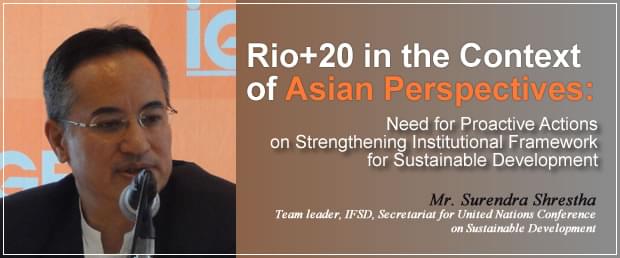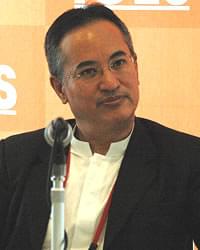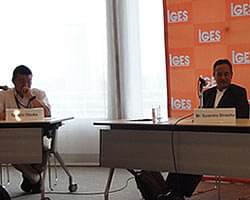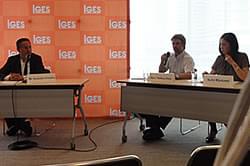|  |
The United Nations Conference on Sustainable Development (UNCSD: Rio+20) will take place in Brazil on 4-6 June 2012 to mark the 20th anniversary of the 1992 United Nations Conference on Environment and Development (UNCED), in Rio de Janeiro, and the 10th anniversary of the 2002 World Summit on Sustainable Development (WSSD) in Johannesburg. It is envisaged as a Conference at the highest possible level, including Heads of or other representatives. The Conference will discuss two key themes, which are ‘Green Economy in the context of sustainable development and poverty eradication’ and ‘Institutional Framework for Sustainable Development (IFSD).’
Mr. Surendra Shrestha is currently appointed as the Task Leader of the UN special taskforce in New York, for the preparation of the UN Conference on Sustainable Development. He leads a special team to handle one of the two key themes of Rio+20, which is the IFSD. Prior to his appointment in NY, he served at UNEP as the Director for the Strategic Resource Mobilization and Special Initiatives. He assumed responsibility in UNEP's strategic resource mobilisation and relevant policy development, working closely with various development partners. Mr. Shrestha’s previous work includes UNEP's Regional Director and Representative for Asia and the Pacific. Before joining UNEP, he held senior positions at the Asian Institute of Technology (AIT) and the International Centre for Integrated Mountain Development (ICIMOD). |
 | Surendra Shrestha
Team leader, IFSD, Secretariat for United Nations Conference on Sustainable Development |
|
Expectations for Rio+20
----What kind of scenarios do you envision as possible outcomes from Rio20?
Mr. Shrestha:
There are three main scenarios of outcomes ranging from 1) status quo, 2) incremental, to 3) fundamental. On the status-quo, the centre of gravity in negotiation is in New York and the North-South divide has been the obstacle. As CSD-19 and ongoing climate negotiations have shown, the divide is deep and wide. We need to collectively ensure ‘status quo’ is not an option.
The second option is incremental change. This change will not be sufficient to address the many challenges of the 21st century to achieve sustainable development.
The desirable option is the third scenario, fundamental change or reform. Many UN organisations have their origins in the 1950s and 1960s as product of the Cold War, which resulted in fragmentation within the UN system. In this scenario, these organisations would expect reform to better coherence and coordination to respond to the challenges of the 21st century. This scenario may also include scrapping some obsolete institutions to create room for new and stronger institutions with mandates that are better aimed at all dimensions of sustainable development. This option will require collective effort especially the civil society.
IFSD and its link with Green Economy
---- How do you define IFSD? What are the implications for global, regional and national levels? How should the roadmap/timeframe of strengthening IFSD be framed to achieve sustainable development in Asia?
 |
Mr. Shrestha:
The institutional structure in governments, universities and societies, which we have today, were designed in the late 1700s and 1800s. At that time, the overarching goal was profit and money through increased production and maximum specialisation of the various sectors and silos. This led to the massive extraction of natural resources and increased waste through the industrialisation process. Today, we know our current lifestyle is no longer sustainable. Therefore, this governance structure must move away from growth only orientation to green economy that also delivers on social and environmental goals. This is possibly the link - IFSD as a vehicle to deliver green economy.
The governance structure is slightly more complicated than in other regions. We have five sub-regions and not yet a regional body that integrates the five subregions. Many of the countries in the region are emerging powers. There is an urgent need to look at governance structure in the Asia and the Pacific region.
Problems of UN system and how to address the challenges
---To strengthen IFSD and enhancing work towards sustainable development, what are the ingredients that are necessary for changing the existing governance structures? What are your views on aims or goals that could strengthen coherence of UN’s work towards sustainable development?
Mr. Shrestha:
The necessary ingredients for reform in the governance structure include: leadership, legitimacy, and efficiency at all levels. With 193 member states in its membership, the UN is the only legitimate body. Many would argue that there is room for improvement in the UN when it comes to leadership and efficiency. The reform will need to address these two perceived deficits
In addition, the reality of today’s globalised and emerging multi-pillared world is that the G20 and specialised agencies are effectively operating outside the UN General Assembly. G20 represents over 60% of the world’s population, 80% of trade and 85% of global GDP. The UN needs to be working closely with G20. The specialised agencies also need to be at the table in the discussions for reform.
Accountability as key to enhance multi-stakeholder participation
--- Multi-stakeholder participation is considered as important to get maximum support for new policies and measures for sustainable development, but with some difficulties. Based upon your experience, what are the effective strategies for improving multi-stakeholder participation for national governments, CSOs, and business sector to enhance constructive discussions towards Rio+20?
Mr. Shrestha:
Looking back in history, the summits held in 1972 and 1992 were transformative. In both these summits, civil society played a key role in the successful outcomes. There is currently the general consensus that multi-stakeholder participation is important and no governments refuses multi-stakeholder consultations towards Rio+20, which was not the case a decade or two ago. However, accountability is still insufficient. Some questions that come to mind include: Which constituency does civil society represent? What is the process to select the representatives? How do the representatives report back to their constituencies? We have to answer these and work for civil society participation in the decision-making process.
 |
Messages from the disaster experiences in Japan towards Rio+20
---What happened in Japan on 11 March 2011 and onwards is an extreme event that was not a major consideration for planning of disaster risk reduction. What are strong suggestions for the Japanese people to bring key messages for Rio+20?
Mr. Shrestha:
It will be useful if Japan could provide lessons in resilience, traditional knowledge, and the way a society transforms itself after a disaster. Today, we have weakness in the General Assembly, which is a lack of common understanding on philosophies of economic growth, quality of life, and so on. The philosophy on how to change society after the disaster could be a very useful case study towards Rio+20 in order to promote the transition of IFSD from growth-centered to more people-oriented structure.
Key Challenges for the Next 10-20 Years in Asia and the Pacific
----What do you think are the key challenges for achieving sustainable development in Asia and the Pacific to be tackled the next 10-20 years? What would you suggest be the focus for an international research institution like IGES, in order to address such challenges?
Mr. Shrestha:
Population trends and urbanisation are issues that will become more pertinent and need research to see whether urbanisation can be moderated and whether we could devise solutions that make it more attractive to live in rural areas, like in Europe .
Asia will be the driver for growth in the 21st century. We have an opportunity to demonstrate to the world the middle sustainable path. There needs to be growth that also delivers on social and environment goals and growth that addresses the poverty and equity. It would be useful if IGES could develop research and policy briefs that build on traditional knowledge and wisdom for this paradigm shift in economic development.
--- We would like to thank for Mr. Shrestha for his informative and encouraging messages. He emphasised the historical and philosophical meaning of IFSD, which reminded us of the fundamental problem of governance at all levels, which can be encountered in many sectors of our society. The problem lies with a lop-sided focus on quantity of growth instead of including also qualitative indicators for human well-being. Moreover, we gained many insights relating to both ongoing and future research, including the importance of multi-stakeholder participation at all levels, and ways in which the Japanese society may stand as an example for post-disaster transformation towards sustainability and disaster resilience. Moreover, he encouraged us to further look into the possibility and opportunities for proactive governance for sustainable development, which is and will be great challenge for IGES research.
Facilitator: T. Otsuka(IGES)
Interviewers: S.H. Olsen, I. Miyazawa(IGES)
|
About "ISAP2011 Interactive Sessions"
ISAP Interactive Sessions inviting selected guests were convened back-to-back with the third International Forum for Sustainable Asia and the Pacific (ISAP2011). A series of meetings intends to facilitate close dialogues between guest speakers and IGES researchers. It also intended to facilitate discussions between the guests and audiences in a participatory manner. Each meeting was designed to have: (i) an interview session conducted by IGES young researchers to get in-depth understanding on the views and opinions of the guest speakers; and (ii) a Q&A session with the audiences. |
|
| | |
|

